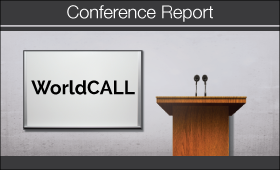Report from the 2013 WorldCALL conference, Glasgow, Scotland.
 By Harold Hendricks, IALLT President and Supervisor at the Humanities Learning Resource Center at Brigham Young University.
By Harold Hendricks, IALLT President and Supervisor at the Humanities Learning Resource Center at Brigham Young University.
DOI: https://www.doi.org/10.69732/BHDZ1326
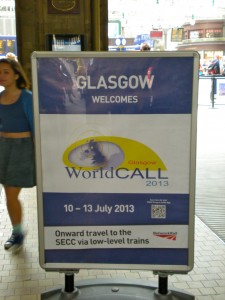
Approximately 450 CALL researchers and practitioners gathered in Glasgow to attend the fourth WorldCALL conference, with the theme of “Sustainability and CALL.” Over 250 presentations were offered as well as posters and courseware demonstrations. WorldCALL is held every five years and is aimed at providing both a worldwide view of CALL activities and a venue where individuals from parts of the world that are not served by a regional CALL organization may present their work and connect with colleagues. Through a scholarship program, WorldCALL also brings individuals from countries where funding for such conferences is difficult to obtain, but who have shown promise in the field.
The Executive Director of WorldCALL is Mike Levy, Professor at The University of Queensland, Australia and he is assisted by a steering committee, drawn from the various international CALL organizations, and a local organizing committee. The 2013 conference was hosted by Dr. David Barr of the University of Ulster, Northern Ireland, and held in the Scottish Exhibition and Conference Centre in Glasgow, Scotland. The location was once the shipyards along the River Clyde but is now being redeveloped into a modern focal point for entertainment, business and residences.
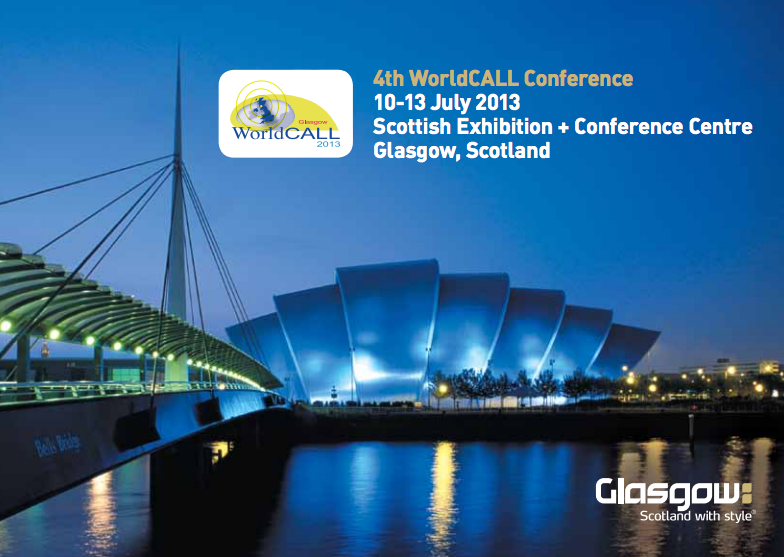
Presentations over the three days of the conference were drawn from categories of research, reflective practice, and CALL development. Most sessions consisted of 30 minute papers, with longer sessions for panels. Posters were set up in the main exhibition hall each day and a courseware demonstration session was held on Thursday and Friday. Each day featured a plenary session. See the entire program for both titles and abstracts on a very wide-ranging list of topics.
On Thursday, the plenary was given by Dr. Diane Larsen-Freeman through video conference from Michigan. Dr. Larsen-Freeman is a Research Scientist at the English Language Institute at the University of Michigan. Her topic was “On links between new technologies and language as a complex dynamic system.” She discussed the basics of Complexity Theory and then explained how CALL was central to her view of language as a complex dynamic system.
Friday’s plenary was artistically and humorously presented by Professor Jozef Colpaert, Vice-Chairman of the Institute for Education and Information Sciences, and the R & D director of the LINGUAPOIS Language Institute at the University of Antwerp, Belgium. Professor Colpaert began by issuing a survey about attitudes and perceptions towards the academic value of CALL activities and then reviewed what he felt to be the current pitfalls and myths of CALL research and practice. He finished by proposing that educational engineering should be considered both an instructional design model and a research method that can produce truly sustainable CALL deliverables and increase the academic value of CALL research and development.
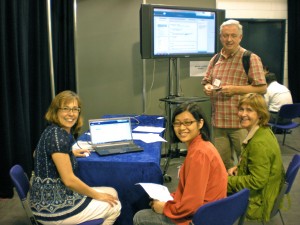
On Saturday, the attendees were treated to a prime example of CALL development and implementation done correctly, by Emerita Bañados-Santana, Director of the MECESUP UCO-601 web-based, distance learning project funded by the Chilean government to enhance the English language skills of university faculty in order to prepare them for advanced study at international universities. Her presentation followed the development of an integrated, web-based communicative English language program at the Universidad de Concepción (UdeC). She described early efforts and tutorial call and how through research and consultation with world CALL authorities they transformed their program to emphasize listening comprehension, oral production, and intercultural competence through topic-based objectives. The program was developed over eight years of intensive work and includes an e-learning interactive multimedia platform, online monitoring through teacher-tutors and native speakers, face-to–face EFL teacher-led classes, and oral and online assessments. Her comments were illustrated with many short videos demonstrating both the features of the system and the actual progress of the students.
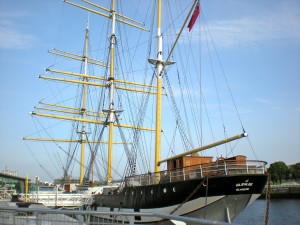
The conference was not all work. On Friday night a wonderful banquet and Scottish Ceilidh dancing took place aboard the Tall Ship—the Glenlee, one of the few remaining sailing ships that was built in the Glasglow shipyards near where she now is anchored. The food was delicious and the dancing well-enjoyed. See for yourself!

